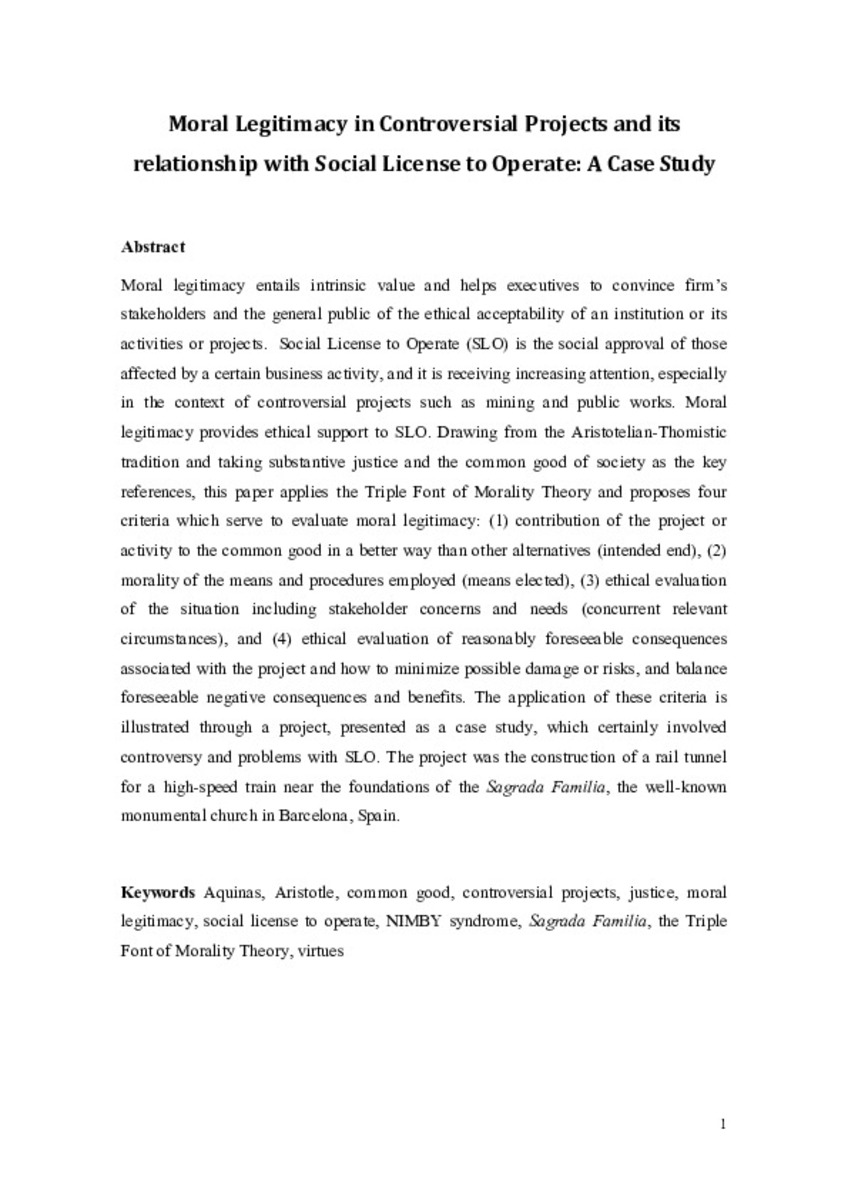Full metadata record
| DC Field | Value | Language |
|---|---|---|
| dc.creator | Melé, D. (Domènec) | - |
| dc.creator | Armengou, J. (Jaume) | - |
| dc.date.accessioned | 2021-05-26T08:21:30Z | - |
| dc.date.available | 2021-05-26T08:21:30Z | - |
| dc.date.issued | 2015-10-13 | - |
| dc.identifier.citation | Melé, D. (Domènec); Armengou, J. (Jaume). "Moral legitimacy in controversial projects and its relationship with social license to operate: a case study". Journal of business ethics. (136), 2015-10-13, 729 - 742 | es |
| dc.identifier.issn | 1573-0697 | - |
| dc.identifier.uri | https://hdl.handle.net/10171/60642 | - |
| dc.description.abstract | Moral legitimacy entails intrinsic value and helps executives convince firm’s stakeholders and the general public of the ethical acceptability of an institution or its activities or projects. Social license to operate (SLO) is the social approval of those affected by a certain business activity, and it is receiving increasing attention, especially in the context of controversial projects such as mining and public works. Moral legitimacy provides ethical support to SLO. Drawing from the Aristotelian-Thomistic tradition and taking substantive justice and the common good of society as the key references, this paper applies the Triple Font of Morality Theory and proposes four criteria which serve to evaluate moral legitimacy: (1) contribution of the project or activity to the common good in a better way than other alternatives (intended end), (2) morality of the means and procedures employed (means elected), (3) ethical evaluation of the situation including stakeholder concerns and needs (concurrent relevant circumstances), and (4) ethical evaluation of reasonably foreseeable consequences associated with the project and how to minimize possible damage or risks, and balance foreseeable negative consequences and benefits. The application of these criteria is illustrated through a project, presented as a case study, which certainly involved controversy and problems with SLO. The project was the construction of a rail tunnel for a high-speed train near the foundations of the Sagrada Familia, the well-known monumental church in Barcelona, Spain. | es_ES |
| dc.language.iso | eng | es_ES |
| dc.publisher | Springer | es_ES |
| dc.rights | info:eu-repo/semantics/openAccess | es_ES |
| dc.subject | Aquinas | es_ES |
| dc.subject | Aristotle | es_ES |
| dc.subject | Common good | es_ES |
| dc.subject | Controversial projects | es_ES |
| dc.subject | Justice | es_ES |
| dc.subject | Moral legitimacy | es_ES |
| dc.subject | Social license to operate | es_ES |
| dc.subject | NIMBY syndrome | es_ES |
| dc.subject | Sagrada Familia | es_ES |
| dc.subject | The triple font of morality | es_ES |
| dc.subject | Virtues | es_ES |
| dc.subject | Tomás de Aquino | es_ES |
| dc.subject | Aristóteles | es_ES |
| dc.subject | Bien común | es_ES |
| dc.subject | Proyectos de controversia | es_ES |
| dc.subject | Justicia | es_ES |
| dc.subject | Legitimidad moral | es_ES |
| dc.subject | Licencia social para operar | es_ES |
| dc.subject | Síndrome NIMBY | es_ES |
| dc.subject | Triple fuente de moralidad | es_ES |
| dc.subject | Virtudes | es_ES |
| dc.title | Moral legitimacy in controversial projects and its relationship with social license to operate: a case study | es_ES |
| dc.type | info:eu-repo/semantics/article | es_ES |
| dc.editorial.note | The final publication is available at link.springer.com | es_ES |
| dc.identifier.doi | 10.1007/s10551-015-2866-z | - |
| dadun.citation.endingPage | 742 | es_ES |
| dadun.citation.number | 136 | es_ES |
| dadun.citation.publicationName | Journal of business ethics | es_ES |
| dadun.citation.startingPage | 729 | es_ES |
Files in This Item:
Statistics and impact
Items in Dadun are protected by copyright, with all rights reserved, unless otherwise indicated.






